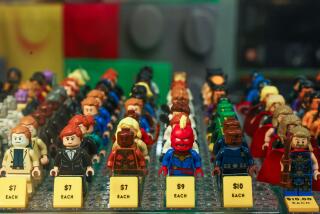Lego ‘Ladyfigs’ raise the hackles of feminists
- Share via
Lego’s so-called Ladyfigs, plastic dolls with slim bodies and budding breasts, are raising the ire of feminists — and profits of the popular Danish toy maker.
Though better known for its plastic building bricks, Lego in December unveiled a female-centric product line that also features play sets such as Andrea’s Bunny House and Butterfly Beauty Shop.
The items, part of the Lego Friends collection, have set off protests, with one feminist group accusing Lego of “selling out girls.” Activists put up a petition on Change.org asking Lego to stop reinforcing gender stereotypes; nearly 60,000 people have signed it.
But the controversy doesn’t appear to be keeping kids away, according to Chief Executive Jorgen Vig Knudstorp. In fact, Lego Friends is enjoying “astonishing” sales, he said.
Twice as many Lego Friends sets were sold than expected, according to the 80-year-old company, which is ramping up production of the merchandise for the Christmas season.
Ladyfigs helped Lego post a 36% increase in profit in the first six months of 2012 compared with the same period last year — to $341.2 million, the company said. Revenue soared 24% to $1.5 billion.
Sales jumped 23% in the U.S. and even more in Asia. Lego predicted it would need to hire 1,000 new workers this year to meet demand.
That’s in stark contrast to the rest of the international toy market, which is struggling
Amid the blowback over Lego Friends, the company has met with critics and said it was only trying to answer requests from customers for “more details and interior building, a brighter color palette, a more realistic figure, role-play opportunities and a story line that they would find interesting.”
Knudstorp said Lego Friends was helping construction toys become “more relevant for girls.”
“We look forward to developing the product line further in the years ahead,” he said.
More to Read
Inside the business of entertainment
The Wide Shot brings you news, analysis and insights on everything from streaming wars to production — and what it all means for the future.
You may occasionally receive promotional content from the Los Angeles Times.











